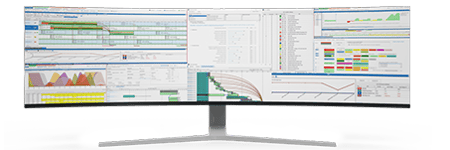
Leveraging Machine Learning for Demand Forecasting in Purchasing Decisions
Purchasing managers hold a pivotal role in ensuring raw materials are available when needed while balancing cost and storage constraints. Accurate demand forecasting is essential to maintain this delicate equilibrium, and traditional methods are no longer sufficient in today’s dynamic market. Enter machine learning (ML): a transformative technology that offers unparalleled accuracy and insights for demand forecasting, enabling purchasing managers to make data-driven decisions with confidence.
In this blog, we will explore how leveraging machine learning for demand forecasting can revolutionize purchasing decisions, and how integrating advanced planning tools like PlanetTogether with enterprise systems such as SAP, Oracle, Microsoft Dynamics, Kinaxis, or Aveva can maximize these benefits.

The Challenges of Traditional Demand Forecasting
Demand forecasting in the food and beverage industry has traditionally relied on historical data, manual inputs, and basic statistical models. While these approaches offer some level of predictability, they often fall short in addressing the complexities of today’s supply chain, such as:
Seasonal Fluctuations: Predicting seasonal demand for products is challenging due to its dependency on multiple variables, including weather, holidays, and cultural trends.
Volatile Consumer Preferences: Rapidly changing consumer tastes require more dynamic and adaptive forecasting models.
Supplier Variability: Variations in supplier lead times and pricing further complicate purchasing decisions.
Waste Reduction: Over-purchasing leads to spoilage, while under-purchasing results in stockouts and lost sales.
Machine learning addresses these pain points by analyzing vast amounts of data and uncovering patterns that traditional methods cannot.

How Machine Learning Transforms Demand Forecasting
Machine learning models excel in handling complex, non-linear relationships between variables. Here’s how ML can enhance demand forecasting for purchasing managers in the food and beverage sector:
Increased Forecast Accuracy
Machine learning algorithms analyze historical sales data alongside external factors like weather patterns, social media trends, and economic indicators. This enables highly accurate predictions, ensuring you purchase just the right amount of raw materials.
Dynamic Adaptability
Unlike static models, ML continuously learns and adapts to new data. For example, if a new health trend causes a spike in demand for plant-based products, the model adjusts forecasts accordingly.
Enhanced Scenario Planning
With ML, you can simulate various scenarios to understand the impact of promotional campaigns, supplier disruptions, or price fluctuations. This empowers you to make proactive purchasing decisions.
Improved Inventory Management
By predicting demand more accurately, ML helps reduce inventory holding costs and minimize waste—a crucial advantage in an industry where perishability is a constant concern.


Integrating Machine Learning with PlanetTogether and ERP Systems
To fully capitalize on machine learning’s potential, integrating it with advanced planning and scheduling tools like PlanetTogether and enterprise resource planning (ERP) systems is critical. Here’s how such integration creates a robust framework for smarter purchasing decisions:
Data Centralization
PlanetTogether integrates seamlessly with ERP systems such as SAP, Oracle, Microsoft Dynamics, Kinaxis, or Aveva, consolidating data from sales, production, and supply chain operations. This centralized data serves as the foundation for machine learning algorithms, ensuring they have access to comprehensive and accurate inputs.
Real-Time Insights
By connecting PlanetTogether’s real-time scheduling capabilities with ML-powered forecasting, purchasing managers can react quickly to demand changes. For example, if a sudden spike in demand is detected, the system can adjust procurement plans and notify suppliers in real time.
Automated Workflows
Integration streamlines workflows by automating tasks such as generating purchase orders based on forecasted demand. This reduces manual effort and ensures timely procurement, avoiding costly delays.
Collaboration Across Departments
Integration fosters collaboration between purchasing, production, and sales teams by providing a unified platform for decision-making. This ensures that purchasing decisions align with overall business objectives, such as minimizing lead times or maximizing profitability.

Overcoming Implementation Challenges
While the benefits of machine learning and integration are compelling, implementation comes with its own set of challenges. Here are some strategies to overcome them:
Data Quality
High-quality data is essential for machine learning models. Ensure that your ERP system and other data sources are well-maintained and free from errors.
Change Management
Introducing ML and new integrations requires buy-in from all stakeholders. Invest in training and communicate the long-term benefits to your team.
Scalability
Start with a pilot project to test the integration and refine the model before scaling it across the organization.
Vendor Support
Work closely with technology vendors like PlanetTogether and your ERP provider to ensure a smooth integration process and ongoing support.
The role of purchasing managers will become increasingly strategic. Leveraging machine learning for demand forecasting, coupled with advanced planning tools like PlanetTogether and ERP systems, positions purchasing managers to navigate complexity with ease. By embracing these technologies, you not only optimize costs and reduce waste but also contribute to your organization’s sustainability goals and competitive edge.
In a world where agility and precision are essential, the integration of machine learning into demand forecasting isn’t just an innovation—it’s a must. Are you ready to take your manufacturing operations to the next level? Contact us today to learn more about how PlanetTogether can help you achieve your goals and drive success in your industry.




